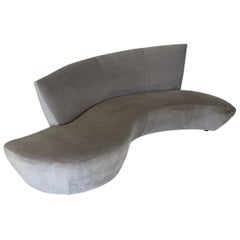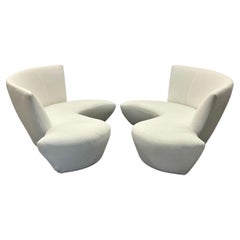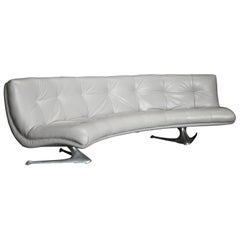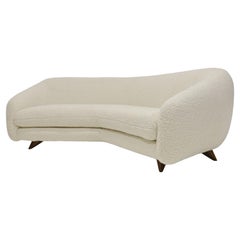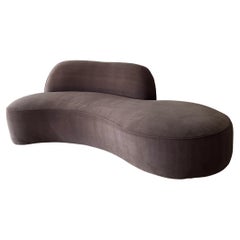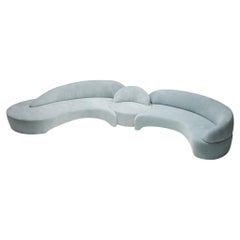Vladimir Kagan Sofas
The pioneers of modern furniture design in America in the mid-20th century all had their moments of flamboyance: Charles and Ray Eames produced the startling, biomorphic La Chaise; George Nelson’s firm created the Marshmallow sofa; Edward Wormley had his decadent Listen to Me chaise. But no designer of the day steadily offered works with more verve and dynamism than Vladimir Kagan. While others, it seems, designed with suburban households in mind, Kagan aimed to suit the tastes of young, sophisticated city-dwellers. With signature designs that feature sleekly curved frames and others that have dramatic out-thrust legs, Kagan made furniture sexy.
Kagan’s father was a Russian master cabinetmaker who took his family first to Germany (where Vladimir was born) and then to New York in 1938. After studying architecture at Columbia University, Kagan opened a design firm at age 22 and immediately made a splash with his long, low and sinuous Serpentine sofa. Furniture lines such as the Tri-symmetric group of glass-topped, three-legged tables and the vivacious Contours chairs soon followed.
Kagan’s choices of form and materials evolved through subsequent decades, embracing lucite, aluminum and burl-wood veneers. By the late 1960s, Kagan was designing austere, asymmetrical cabinets and his Omnibus group of modular sofas and chairs. For all his aesthetic élan, Kagan said that throughout his career, his touchstone was comfort. “A lot of modern furniture was not comfortable. And so comfort is: form follows function. The function was to make it comfortable,” he once commented. “I created what I called vessels for the human body.”
A diverse group of bodies have made themselves at home with Kagan designs. Among the famous names who commissioned and collected his designs are Marilyn Monroe, Gary Cooper, Andy Warhol, David Lynch, Angelina Jolie and Brad Pitt, and firms such as Gucci and Giorgio Armani. His work is in numerous museum collections, including those of the Victoria & Albert and the Metropolitan Museum of Art.
Because of its idiosyncrasy, Kagan’s work did not lend itself to mass-production. Kagan never signed on with any of the major furniture-making corporations, and examples of his designs are relatively rare. As you will see from the offerings on 1stDibs, even decades after their conception, Kagan pieces still command the eye, with their freshness, energy, sensuality and wit.
Late 20th Century American Post-Modern Vladimir Kagan Sofas
Upholstery, Velvet, Wood
Early 2000s American Mid-Century Modern Vladimir Kagan Sofas
Bouclé, Wood
1960s American Mid-Century Modern Vintage Vladimir Kagan Sofas
Aluminum
20th Century American Mid-Century Modern Vladimir Kagan Sofas
Upholstery, Wood
1990s Post-Modern Vladimir Kagan Sofas
Fabric
Early 2000s French Mid-Century Modern Vladimir Kagan Sofas
Wool, Alpaca, Cotton
1980s American Mid-Century Modern Vintage Vladimir Kagan Sofas
Fabric
1980s American Mid-Century Modern Vintage Vladimir Kagan Sofas
Upholstery
21st Century and Contemporary American Modern Vladimir Kagan Sofas
Bouclé, Walnut
1990s American Mid-Century Modern Vladimir Kagan Sofas
Upholstery, Hardwood
Late 20th Century American Mid-Century Modern Vladimir Kagan Sofas
Fabric
Early 2000s American Mid-Century Modern Vladimir Kagan Sofas
Fabric
1970s American Mid-Century Modern Vintage Vladimir Kagan Sofas
Upholstery, Wood
Early 2000s North American Mid-Century Modern Vladimir Kagan Sofas
Upholstery, Walnut
20th Century Post-Modern Vladimir Kagan Sofas
Mohair, Lucite
Mid-20th Century American Mid-Century Modern Vladimir Kagan Sofas
Fabric, Bouclé, Upholstery, Wood
1970s American Mid-Century Modern Vintage Vladimir Kagan Sofas
Upholstery, Wood
Late 20th Century American Mid-Century Modern Vladimir Kagan Sofas
Upholstery, Wood
Late 20th Century American Modern Vladimir Kagan Sofas
Upholstery, Wood
Mid-20th Century American Mid-Century Modern Vladimir Kagan Sofas
Upholstery, Wood
20th Century American Mid-Century Modern Vladimir Kagan Sofas
Upholstery, Wood
20th Century American Mid-Century Modern Vladimir Kagan Sofas
Upholstery, Wood
Late 20th Century American Mid-Century Modern Vladimir Kagan Sofas
Fabric, Cotton, Upholstery, Wood
Early 2000s French Mid-Century Modern Vladimir Kagan Sofas
Wool, Alpaca, Cotton
1960s American Mid-Century Modern Vintage Vladimir Kagan Sofas
Aluminum, Wrought Iron
1990s American Post-Modern Vladimir Kagan Sofas
Bouclé, Upholstery
Early 2000s American Mid-Century Modern Vladimir Kagan Sofas
Leather
1980s American Post-Modern Vintage Vladimir Kagan Sofas
Fabric
21st Century and Contemporary American Modern Vladimir Kagan Sofas
Brass
Late 20th Century American Mid-Century Modern Vladimir Kagan Sofas
Leather, Fabric
21st Century and Contemporary American Modern Vladimir Kagan Sofas
Brass
1960s American Vintage Vladimir Kagan Sofas
Bouclé, Wood
21st Century and Contemporary American Mid-Century Modern Vladimir Kagan Sofas
Fabric, Foam, Wood
1990s American Post-Modern Vladimir Kagan Sofas
Mohair, Foam, Feathers
1980s American Vintage Vladimir Kagan Sofas
Bouclé
1970s American Mid-Century Modern Vintage Vladimir Kagan Sofas
Wood, Leather
1990s Vladimir Kagan Sofas
Velvet
1960s American Mid-Century Modern Vintage Vladimir Kagan Sofas
Aluminum
1980s Italian Post-Modern Vintage Vladimir Kagan Sofas
Ultrasuede
21st Century and Contemporary American Vladimir Kagan Sofas
Upholstery, Walnut
Mid-20th Century American Mid-Century Modern Vladimir Kagan Sofas
Fabric, Cotton, Upholstery, Wood
1990s American Post-Modern Vladimir Kagan Sofas
Upholstery
Early 2000s American Mid-Century Modern Vladimir Kagan Sofas
Leather
Mid-20th Century American Mid-Century Modern Vladimir Kagan Sofas
Fabric, Bouclé, Upholstery, Lucite
Early 2000s American Mid-Century Modern Vladimir Kagan Sofas
Fabric
21st Century and Contemporary American Modern Vladimir Kagan Sofas
Velvet
